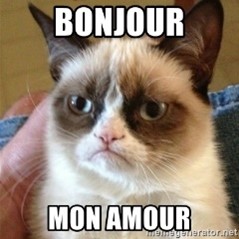Are you looking for an intimate way to describe your sweetheart, lover, or life partner? You could use the language of love, French, and call them "mon amour." This post unpacks the meaning and origin of this expression.
Meaning
The expression "mon amour" translates to "My love" or "my darling" in English. French is the international "language of love," and it has many terms that carry into use in English. Mon amour is one of the more popular French idioms in use today.
It's a common term known in many languages and cultures around the globe. When using "mon amour," you're referring to someone of personal benefit to you, such as a lover or life partner.
It's a term of endearment between intimate parties, where they are looking to place importance on the others person's role in their life. If you're using "mon amour," it's usually in a close setting, without other people around.
Example Usage
"Mon amour, will you be coming back to my place tonight, or are we going to yours? The choice is up to you. I will follow you anywhere."
"I love you like no other woman before in my life. Mon amour, you are the woman for me, and I want everyone to know it."
"I knew I loved you from the first minute I saw you walking at the train station. Mon amour, will you make me the happiest man in the world and marry me?"
"I think we should take a trip to France this year. You know what they say, French is the language of love, Mon amour."
"French is such a special language. Every word just sounds like fine silk when people speak it. Don't you think it's a wonderful language, mon amour?"
"Mon amour, you mean everything to me, and I would never put you in harm's way, no matter the cost to my personal safety."
"I love you, mon amour. I will always do my best to be by your side through thick and thin and in sickness and health. You can count on me to be there for you."


Origin
The expression “mon amour” originates from the French language. It’s an expression between two partners or lovers. The word “amor” has been around in French since circa 1300. “Amor” translates to love, affection, and even friendship.
Language experts are unsure of how the expression ended up in English. However, it’s thought that it entered English through the British/ French political policy relationship in the 1400s and 1500s. The phrase “mon amour” features in media in TV shows, books, articles, music, and more.
It‘s a globally-known term and reference to someone that you love. However, it doesn’t refer to friends or family members in the English version of the phrase. It’s a reference to your lover, sweetheart, or partner.
Phrases Similar to Mon Amour
- I love you.
- My lover.
- My darling.
Phrases Opposite to Mon Amour
- I hate you.
- I loathe you.
What is the Correct Saying?
- Mon amour.
Ways People May Say Mon Amour Incorrectly
Some people may use the phrase as a pet name for their partner. They may also use it when addressing family members or people close to them. This moniker is strictly reserved for your partner, lover, or sweetheart. It is not suitable for use in professional conversations.
Acceptable Ways to Phrase Mon Amour
You can use “mon amour” when talking to your partner, sweetheart, or love interest. The word translates to “my love,” or “my darling.” If French isn’t your home language, you can use it in situations where you’re trying to express your love to your partner to them directly.
It’s usually a term people use in an intimate setting (which might be why people see French as the language of love), but it also suits everyday use. Mon Amour is more suitable for onetime use occasionally than a et name for your partner.